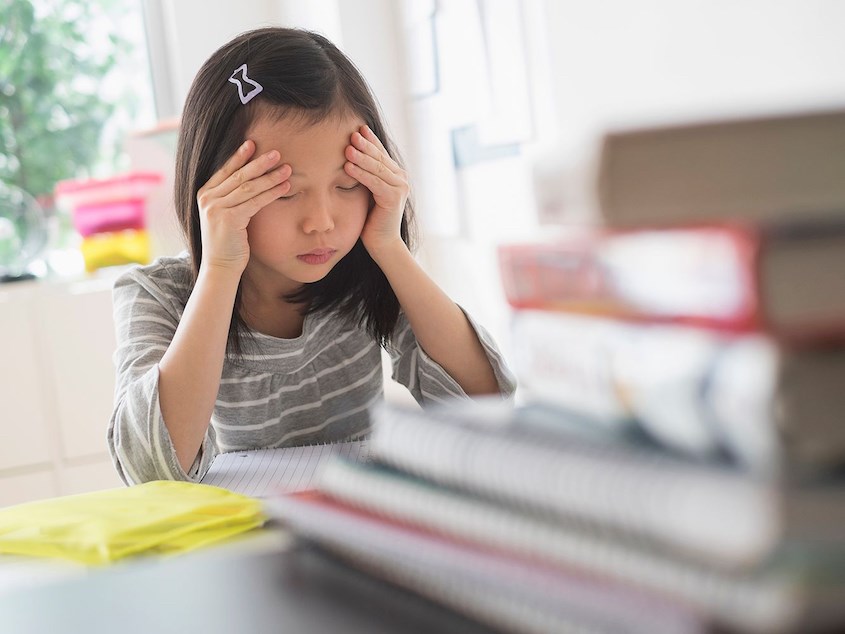
Signs of depression in puberty are similar to those of depression in other subjects. Patients feel bored, moody, hopeless, gradually lose interest in events happening around, no longer have faith and hope in the future. Detecting depression early at a young age will have a lot of hope for complete treatment.

Signs of Puberty Depression Shouldn’t Ignore
Table of Contents
ToggleWhat is pubertal depression and is it serious?
Depression is a fairly common mental disorder that can affect anyone, from children to the elderly. However, experts also say that children who are entering puberty will have a higher risk of depression than usual.
At the stage of puberty, children are beginning to form and develop comprehensively physically, mentally, thinking, intellectually and emotionally. Therefore, if they encounter this dangerous disease, it will greatly affect their physical and mental health, significantly reducing their quality of life, study and work.
Causes of depression in adolescence
Depression during puberty can happen for a variety of reasons. Among them, hormonal changes are also a cause of this condition. Children are more sensitive to other people’s words and life events due to the increase in hormones during this period. Other causes of depression include:

Causes of depression in adolescence
Study pressure
Subjects who are going through puberty will often face a lot of pressure to study and take exams. Parents sometimes set goals for their children. Those goals make me obsess about grades and feel stressed before each exam. If this situation is left unresolved for a long time, it will make the child more likely to fall into a state of sadness, isolation and long-term depression.
Lack of empathy and anxiety
When children enter puberty, they will often be very sensitive. At this time, children need a lot of care, sympathy and concern from parents, relatives and friends. This stage is a time of changes in appearance, emotions, perception, so you will often feel anxious and confused. If parents do not fully equip their children with knowledge or are indifferent, children will show signs of depression.
Family influence
According to research, people who live in a happy family, healthy living environment are less likely to suffer from depression. In contrast, children born and raised in a family with frequent conflicts and discord between parents will easily affect the child’s psyche. In addition, events such as bereavement, parental divorce, domestic violence, etc. will also increase the risk of depression during puberty.
Extreme thinking
Puberty is a period of marked changes in body shape, outlook, and perception. If families, schools and schools do not prepare healthy education, children can develop extreme and wrong thinking. When children realize that real life is not what they imagined, many children will isolate themselves and live on their own. That leads to depression and signs of depression in puberty.
Signs of Depression in Puberty You Shouldn’t Ignore
Signs of depression during puberty may include changes in attitude and behavior such as the following:
Sad mood
Sad mood is the first manifestation of depression in general and a sign of depression in puberty in particular. When suffering from this disease, children often have sad and melancholy facial expressions, and their words and behaviors are clear and sad. Over time, the level of sadness will become more and the child loses all positive emotions such as joy, happiness, optimism, excitement, etc.

What are the signs of depression in puberty?
Losing interest
Signs of depression in puberty will often lose interest in activities going on around, even hobbies that were once enjoyed. Children often want to isolate themselves, do not want to interact or communicate with anyone. Especially in a crowded, noisy place. These subjects will also often tend to want to withdraw, create a cover for themselves, away from the attention of those around them.
Anger for no reason
When the pressure affects children often and lasts for a long time, it will make them angry and short-tempered, unable to control their own emotions. Even when there are no problems or events, children can feel upset and angry for no reason.
In particular, in some cases, if the anger cannot be completely resolved, it will cause the child to appear violent and screaming. Worse, you can hurt yourself and those around you.
Feeling pessimistic
The decrease of emotions when depressed makes children become pessimistic about the future, feeling that the present life is boring and boring. This sign of depression in puberty manifests itself through words spoken to friends, relatives, teachers, and parents. Pessimism about the future will make children surrender to the present, do not want to study, or play and tend to close themselves.
Difficulty concentrating, forgetful
Children who are in puberty usually have a fairly stable memory, but depressed subjects show signs of severe memory impairment. Children have a lot of trouble focusing on school or other tasks. This symptom will have a direct impact on the learning process. In addition, it also greatly affects daily life, activities and health.

If children often have difficulty concentrating, forgetfulness is a sign of depression
Feeling useless
The next sign of depression in puberty is that children often feel guilty, always feel disappointed, not confident about themselves. Since then, almost do not want to do anything, including study. This situation will make children become self-deprecating, no longer believe in themselves, gradually lose faith in life, seriously affecting their studies and future.
Rebellion, Rebellion
An easy sign of puberty depression is antisocial behavior, always resisting the opinions or advice of parents and people around.
Children don’t want to absorb ideas and any suggestions. In addition, in some other cases, there are signs of rebellion, speech and behavior often change suddenly. Statistics show that signs of depression in puberty can be accompanied by conduct disorder or attention deficit hyperactivity disorder.
Sensitive to criticism
Children between the ages of 11 and 14 are the most sensitive, because at this time they gradually develop physically and become aware of their own behavior. Especially those with depression will often feel uncomfortable and sensitive to criticism, criticism or insults. If children often receive negative, malicious or critical words, it can make them even more self-deprecating, see themselves as unable to do anything, thereby blaming themselves.
Thinking about death
Cases of suicidal thoughts and behavior are already severe manifestations of pubertal depression. Children often think about death, depending on the severity of the illness, suicidal thoughts and behaviors will increase.
Especially for children at puberty, this sign can become even stronger, children always want to free themselves from pressure and stress. The suicidal behaviors appear in many different forms, so families and parents need to pay special attention to children.
What to do when a child shows signs of pubertal depression?
Here are a few commonly used measures to treat depression during puberty or as soon as a child shows signs of pubertal depression:
Treatment at home
When the symptoms of pubertal depression are mild and frequent, home treatments can provide noticeable improvement. For more severe cases, these measures will also contribute to symptom relief and emotional support for the child.

Change to a healthy diet to improve depression
Some home remedies for depression include:
- Fast change your dietPay attention to tolerating foods rich in vitamins and minerals that are good for the body as well as the brain. At the same time, limit hot spicy dishes, fried foods with a lot of fat, fatty foods, … Especially absolutely do not drink alcohol, smoke, use addictive substances.
- Improve your health by exercise regularly right at home. It is best to apply only simple and gentle exercises to help blood circulation and brain to be balanced, mentally comfortable. Children should be encouraged to spend 30 minutes a day cycling, jogging, yoga, walking, swimming, meditating to be more comfortable and stable.
- Practice habits go to bed before 23 o’clock Every day, you should sleep for at least 8 hours so that your body has time to rest and relax.
- Arrange a time study, work and live rationally, avoid studying too hard.
- Positive tparticipate in activities have fun and entertainment to improve relationships and improve mood.
Increase sports practice
Parents should let children participate in gentle sports activities such as walking, yoga, meditation, or sports that children love. Physical activity helps release neurotransmitters and “nerve nourishment proteins,” which cause nerves to make new connections, improve brain function, and have a role in reducing symptoms. depression.

Increasing exercise for patients with depression
>>> See more: Sports drinks – 10 best types of water PT recommends
Apply psychotherapy
Psychotherapy is one of the most highly regarded safe and effective methods for treating symptoms of depression. This measure is carried out through the use of psycho-scientific language to directly influence the patient’s thinking and thinking.
With professional techniques, linguistic science, NLP, human psychology, etc., psychologists will help patients solve problems, relieve pressure, and stress so that they can think about their thoughts. thinking and understanding the problem more correctly.
How to prevent depression during puberty
To prevent teenage depression, you should spend more time with your loved one. Try suggestions to do things your child enjoys, learn to keep a journal, or go on a relaxing trip. In addition, regularly confiding and sharing about life, learning, and feelings is an effective way to help children feel the love of their parents.

Regular travel is also a way to prevent depression in puberty
In addition, you should regularly find out what problems your children are facing to help them find solutions, not letting bad events affect their lives for many days.
Signs of depression in puberty are now quite common in children. For timely detection and treatment, families need to have proper care for their children. In addition to the treatment methods, the care and scientific education of the family also help children overcome this disease, helping children develop mentally and physically in a healthy way.

John Alen was born in 1971 and is a doctor in the healthcare and psychology fields with many years of experience. He is currently working at easyhealthylive.com, a leading health and psychology blog. Having studied at Y1 National Medical University named after IM Sechenov, John Alen is using his knowledge and experience to help improve the physical and mental health of people in the United States.









